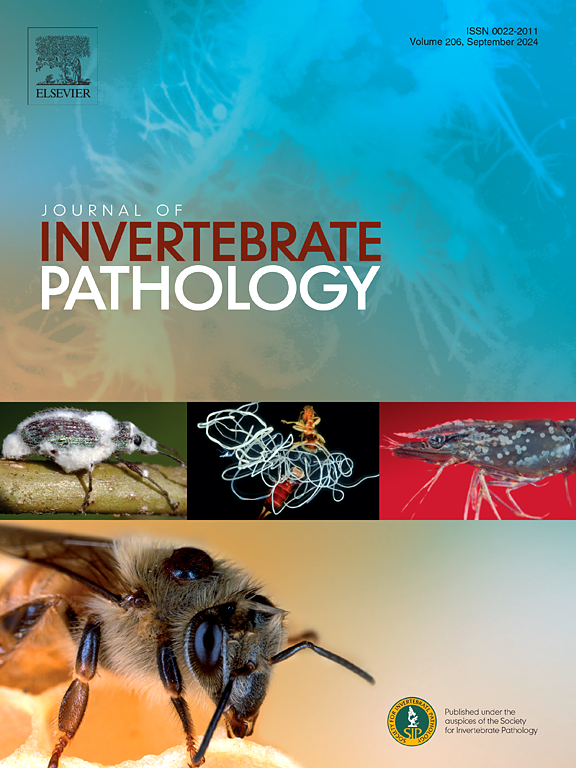Microalgae functional feed additives strengthen immunity and increase longevity in honey bees
IF 2.4
3区 生物学
Q1 ZOOLOGY
引用次数: 0
Abstract
Honey bees (Apis mellifera) are faced with a myriad of immunological threats, often worsened by poor nutrition. The use of functional feed additives offers a promising strategy to address colony nutritional deficiencies while helping strengthen bee immune responses and mitigate stress. Microalgae have gained recognition as beneficial diet ingredients for livestock due to their abundance of essential nutrients and immunomodulatory properties. Here, we tested the effects of microalgae-containing feed on honey bee immunity, lifespan, and nutrient assimilation. Caged bees were fed a commercial artificial diet or the same diet with added pollen, spirulina (Arthrospira platensis) or Chlorella (Chlorella vulgaris). Immune-related gene expression, longevity, and body weight were measured following six days of ad libitum feeding. All diets resulted in similar body weights, indicating adequate nutrient assimilation. While bees fed the pollen-containing diet lived the longest (median lifespan = 51 days), bees fed spirulina- and Chlorella-containing diets lived significantly longer (median lifespan = 48 and 46 days, respectively) than those fed the base diet (median lifespan = 40 days). Spirulina-fed bees exhibited significantly higher expression of several antimicrobial peptide (AMP) genes relative to the base diet and had superior bacterial clearing ability after injection with live E. coli cells. We propose that this increased immunocompetence is at least partially due to elevated AMP levels. Our findings suggest that the tested microalgae can improve honey bee longevity and immune functions with negligible health costs relative to a commonly used artificial diet. Determining the effects of microalgae feed additives in field-relevant contexts and in the face of diverse pathogen challenges should be the focus of future research efforts.

微藻功能性饲料添加剂增强蜜蜂免疫力,延长蜜蜂寿命
蜜蜂(Apis mellifera)面临着无数的免疫威胁,往往因营养不良而恶化。使用功能性饲料添加剂为解决蜂群营养缺乏提供了一种有前途的策略,同时有助于增强蜜蜂的免疫反应和减轻压力。微藻因其丰富的必需营养素和免疫调节特性而被公认为牲畜有益的饲粮成分。在这里,我们测试了含微藻饲料对蜜蜂免疫、寿命和营养吸收的影响。分别饲喂商业人工饲料或添加花粉、螺旋藻(平节螺旋藻)或小球藻(小球藻)的饲料。免疫相关基因表达、寿命和体重在自由喂养6天后被测量。所有的饮食导致相似的体重,表明充分的营养吸收。饲喂含花粉饲料的蜜蜂寿命最长(平均寿命为51天),饲喂含螺旋藻和小球藻饲料的蜜蜂寿命显著长于饲喂基础饲料的蜜蜂(平均寿命为40天)(平均寿命分别为48天和46天)。与基础饲料相比,以螺旋藻喂养的蜜蜂对几种抗菌肽(AMP)基因的表达显著增加,并在注射活的大肠杆菌细胞后具有更强的细菌清除能力。我们认为这种免疫能力的增强至少部分是由于AMP水平的升高。我们的研究结果表明,与常用的人工饲料相比,所测试的微藻可以提高蜜蜂的寿命和免疫功能,而健康成本可以忽略不计。确定微藻饲料添加剂在田间相关环境和面对多种病原体挑战时的效果应该是未来研究工作的重点。
本文章由计算机程序翻译,如有差异,请以英文原文为准。
求助全文
约1分钟内获得全文
求助全文
来源期刊
CiteScore
6.10
自引率
5.90%
发文量
94
审稿时长
1 months
期刊介绍:
The Journal of Invertebrate Pathology presents original research articles and notes on the induction and pathogenesis of diseases of invertebrates, including the suppression of diseases in beneficial species, and the use of diseases in controlling undesirable species. In addition, the journal publishes the results of physiological, morphological, genetic, immunological and ecological studies as related to the etiologic agents of diseases of invertebrates.
The Journal of Invertebrate Pathology is the adopted journal of the Society for Invertebrate Pathology, and is available to SIP members at a special reduced price.

 求助内容:
求助内容: 应助结果提醒方式:
应助结果提醒方式:


